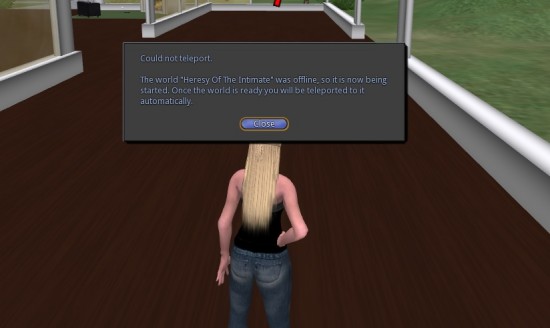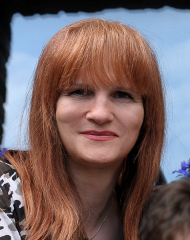Sometime soon, Kitely — the low cost, on-demand, cloud-based grid – will turn on hypergrid connectivity.
This may seriously affect the hosting market, as some users will turn to Kitely for low-use residential or educational sims — even while they continue to patronize shops, events, and other facilities elsewhere on the hypergrid.
A typical medium-use OpenSim region retails for between $30 and $60 a month, with an average capacity of 15,000 prims and 20 simultaneous avatars. On open grids like OSGrid prices tend to be on the lower end, because of competition from multiple hosting vendors, and are on the higher end on commercial grids like InWorldz and Avination.
Compare that to Kitely, where $35 a month gets you unlimited use of 20 regions, each capable of holding up to 100,000 prims and 100 simultaneous avatars.
There are two reasons why Kitely is able to offer such a low price. First, the regions are put to sleep when not in use. Most residential regions are empty most of the time, as are educational regions when classes aren’t in session. That’s a lot of savings right there.
The other reason is that Kitely charges visitors for their time, unless the region owner decides to pony up for the traffic, at a rate or around 20 cents per hour per user. Kitely users all get two hours a month free, and if they spend more time than that on Kitely worlds they’ll either have to get a subscription, or buy time a-la-carte — or only visit regions where the owners pick up their costs.

So if you’re a builder looking for a lot of land to build on, or if  you’re just looking for some residential land, or a place to hold occasional classes, Kitely is a great deal. So far, however, you’d have been pretty lonely there — Kitely reported just 238 active users over the past month, making it the ninth-busiest OpenSim grid — even though its total land area made it the third largest.
Once hypergrid is turned on, loneliness will no longer be an issue — region owners will be able to teleport to over 100 other grids, including OSGrid, Francogrid, Avination, Craft, and many other large and popular grids.
So that’s what’s happening. Now, what are grids going to do about it?
Will they continue to offer $60 regions and hope that their residents will continue to pay out of loyalty? Or will they attempt to match Kitely’s on-demand cloud-based hosting — which is not as simple as it sounds.
On-demand alternative: 3D Hosting
Fortunately for grid owners without the skills needed to switch to an on-demand model, one OpenSim vendor is working on providing a solution.

“In our system setup, that would not be hard to offer at all and we would be able to quickly provide the feature if asked for it,” said Melanie Thielker, CEO of London-based Avination Virtual Ltd. and founder of the Avination grid. Thielker, an OpenSim core developer, also runs 3D Hosting, a hosting company that offers private-label grids and individual regions to customers.
“Pulling an average region from cold storage takes about two to three minutes in our cloud,” she said. “That could be improved by foregoing high compression factors to speed unpacking.”
This is already faster than most other OpenSim hosting companies can load up regions, she said.
“Others use OAR files, which we don’t use,” Thielker said. “We have a significantly faster storage system and we also have an automated request and delivery system for suspended regions.”
The Avination grid is not currently hypergrid-enabled, but Thielker has pledged to turn on hypergrid connectivity once hypergrid security has been overhauled. She and hypergrid inventor Crista Lopes are currently working on Hypergrid 2.0, which will allow individual creators to decide whether their content can travel over the hypergrid, or must stay on its grid of origin.
So far, she said, customers haven’t been asking for on-demand regions.
“At the moment there doesn’t seem to be a large enough market for this yet outside of Kitely,” she told Hypergrid Business.
Looking for a solution
SouthPaw Estates founder Timothy Rogers (also known as Timothy Hoxley in OSGrid) said that he’s interested in finding a way to make on-demand regions work.
“I will be looking on getting my hands on code that would boot up regions on demand through teleport requests,” he told Hypergrid Business. “However, as of right now, there is no way to do this. But does not mean I am not going to keeping my ears to the horn or investing to get some work like that done.”
SoftPaw did announce a different kind of cloud-based hosting today, however — short-term region rentals. A simulator for a big event would run between US$8 to $30 a day, the company said, depending on the requirements.
Other companies also offer short-term rentals.
SpotON3D’s BoostCloud service, for example, rents high-capacity, cloud-based regions by the hour.
And there are companies like Virtual Event Planners International that specialize specifically in short-term events on the OpenSim platform.
Dreamland Metaverse is also considering offering short-term sim rentals.
“But such an offer would be quite different than what Kitely offers at the moment,” a company spokesman told Hypergrid Business. “The process of starting up regions can take quite a while. Especially the kind of power users hosting OpenSim regions from Dreamland Metaverse often use many prims and sometimes even thousands of scripts on their regions. Starting up such a region can take up to 15 or 20 minutes. Only small regions with not many scripts start fast. Users are not willing to wait a long time until they can enter a region.”
Another issue holding back hosting companies is that some are still configuring new regions by hand.
“My region setup is still manually configured,” said Fernando Oliveira of Oliveira Virtual Lands. “Today I set up a new region in 30 minutes.”
Manual setups make it impossible for to have on-demand regions.
“I was working on a automated solution, but had to put on hold for a while because lack of time to implement it,” he told Hypergrid Business. “As soon I get a little time, I can finish the project.”
SouthPaw’s Rogers is also working on an automated system — and he said he will share it with the OpenSim community.
“It is being worked on, and I have got some quotes on getting it beefed up to work even better,” he said. “I might be doing a Kickstarter for it soon, as it will be an open source product, and will allow anyone, grid owners, or kids in their basement to download for free and tinker with it.”
- OSgrid back online after extended maintenance - April 16, 2025
- Analysts predict drop in headset sales this year - March 25, 2025
- OSgrid enters immediate long-term maintenance - March 5, 2025
